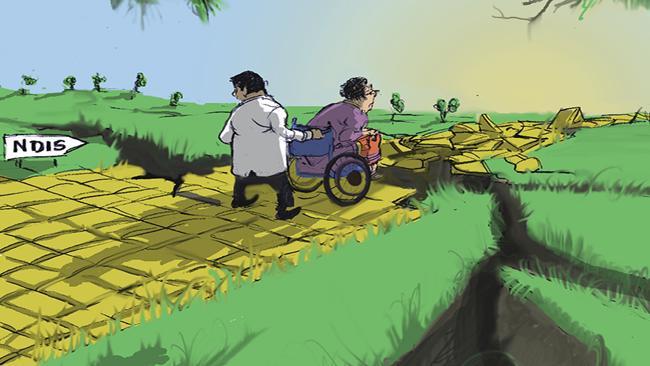
IN July last year, Julia Gillard curtly dismissed the Liberal premiers' suggestion of a levy to fund the national disability insurance scheme without proposing any alternative. A week ago she "changed her mind". Suddenly, the whole scheme, until then merely aspirational, is suffused in the warm glow of consensus, despite an increasingly dire fiscal outlook.
It seems churlish to probe that consensus too deeply. As the parable of the prodigal son teaches us, virtue delayed is better than virtue denied; and it is rarely wise to be squeamish about politicians' motives. Death-bed conversions, on the other hand, invite scepticism, and the Prime Minister's is no exception.
After all, Gillard's maxim has been to spend first, pay never. Now, faced with overwhelming support for the NDIS -- now called DisabilityCare -- she has abruptly reversed course. And turning the dross of circumstance into the glitter of opportunity, she has successfully draped a new tax with the aura of moral urgency.
Yet she has said nothing about exactly how the money will be outlaid. And that is unsurprising. For it is the specifics that raise the painful choices.
Where will the cut-off be in the degree of disability covered? What will be done about disabled people turning 65? Given those decisions, how much funding will be involved in total and where will it come from? And how will that funding be increased to accommodate a disabled population that, according to the Commonwealth Actuary, is growing by 1 per cent a year, while service costs are rising even more rapidly than that? With an election looming, it is easier to leave those questions hanging. That lets Gillard proffer hope to many thousands of Australians whose needs have long been denied. And by imposing no limits herself, she opens the way for Labor to attack a future Coalition government when it confronts the dilemmas she dodged -- much as Labor has done with public expenditure cuts in Queensland and NSW.
But the gains for Gillard go much further. Given her fiscal woes, it is truly better to receive than to give; and the new tax improves her budget bottom line by about $10 billion in the period to 2016-17, even if the funds are transferred to trust accounts similar to those established by the Howard government for future disbursement.
This is generosity on the instalment plan, and at other people's expense. But it would be foolhardy to bank on Gillard's assurances. For Labor has form in dealing with trust accounts. Up to $21.3bn in Howard government surpluses went into "lock box" funds, whose capital was to be maintained in perpetuity. As soon as Labor came to power, it restructured them, removing any "lock box" restrictions. And as its deficit spiralled out of control, it plundered half their capital.
Now, Labor's "raiders of the lost funds" are pillorying Tony Abbott for demanding details of the proposed arrangements. But Abbott ought to demand even more than that: he should require credible agreement on the scheme's long-term deployment.
Such an agreement's outlines are readily identified. There should be a transparent mechanism for addressing decisions about eligibility, service coverage and delivery. Those decisions should be fully funded by the levy and constrained by the revenues it obtains. That way, the levy would accurately signal to taxpayers the cost of the scheme while providing beneficiaries with an assured source of funding. And the scheme should be structured to meet solvency requirements no less demanding than those imposed on other insurers.
There should also be agreement on the funding source. As the Henry tax review argued, the Medicare levy is poorly designed, as it is assessed differently from the income tax, distorting effective tax rates. So as to avoid aggravating those distortions, the new levy should be aligned with the income tax from the outset. And it would be a real step forward if the commonwealth and the states agreed to eventually transform it into a modest, separately accounted for, increase in the GST, so the states could finance the scheme without relying on highly inefficient taxes.
Last but not least, while addressing areas of greatest hardship first, deployment should proceed by small steps, allowing the lessons of experience to be learned and accommodating inventive solutions.
None of that would ensure an ideal system. Perfection, however, is not of this world, and history cautions against grand schemes to improve the human condition. A generous, at times cloyingly sentimental, nation, we too readily succumb to smothering in dollars problems that distress us, as if mere spending commitments could absolve troubled consciences. And the likelihood of such schemes primarily enriching service providers, rather than assisting the disadvantaged, only helps ensure their outcomes are invariably disappointing.
The $25bn outlaid each year for services to indigenous Australians is a searing example, as the billions sought for the Gonski reforms may prove to be.
Compared to those approaches, a fully funded agreement for the scheme's evolution has much to recommend it. By eschewing unaffordable promises, that are only ever made to be broken, it would avoid the problems that have plagued efforts to improve mental health services: notably, vast spending pledges that degenerate into smoke and mirrors, with the whole process drowned in reviews and ministerial announcements as vacuous as they are high minded.
Disabled Australians deserve better. They can congratulate themselves on placing their concerns at the top of the public agenda. But they must remember that in policy matters, even the greatest victories are often undone by long strings of petty defeats. As the warm glow of consensus fades, today's common ground becomes tomorrow's fractured terrain, and yesterday's wholly creditable sentiments disappear in the cracks. Realism, not parables, is needed to navigate that road ahead.



